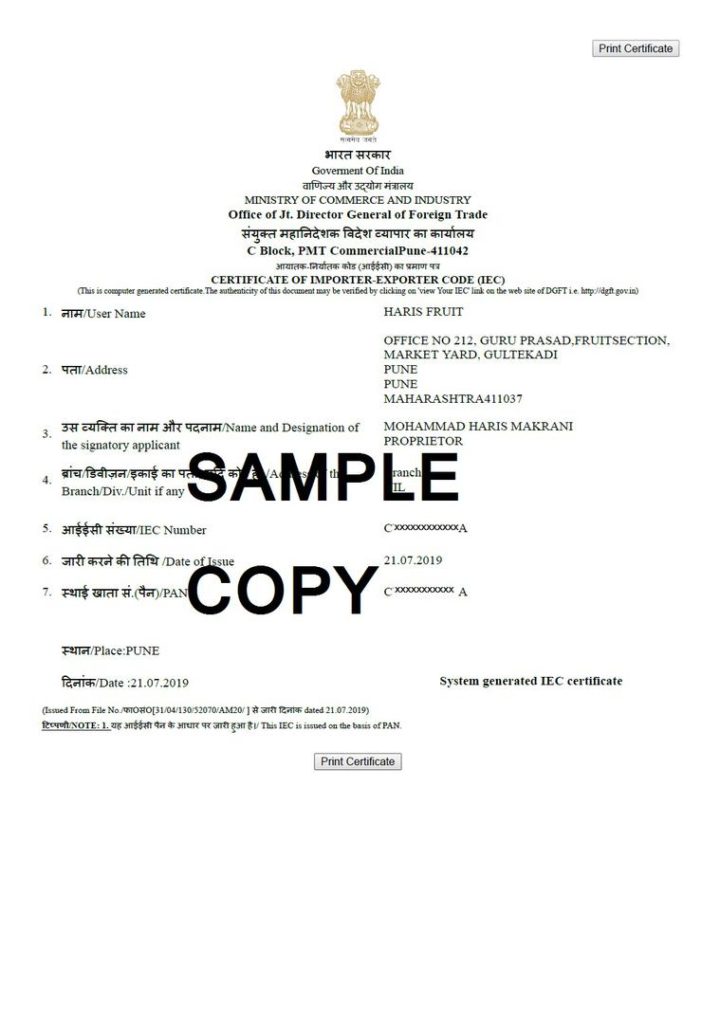Demystifying IEC Certificate: A Comprehensive Guide and FAQs
Introduction
The Importer Exporter Code (IEC) certificate is a critical document for businesses engaged in international trade, serving as a key identifier for customs authorities. In this comprehensive guide, we delve into the nuances of the IEC certificate, its significance, application process, and provide answers to frequently asked questions (FAQs).

Understanding the Significance of IEC Certificate
- Key Identification for International Trade:
- Unveiling the pivotal role of the IEC certificate as a unique identifier for businesses involved in importing and exporting goods and services.
- Essential for customs clearance and compliance with international trade regulations.
- Legal Recognition and Compliance:
- The importance of the IEC certificate in gaining legal recognition and ensuring compliance with international trade laws.
- A prerequisite for opening foreign bank accounts and participating in global tenders.
Step-by-Step Guide to Sample IEC Certificate
- Determine the Need for IEC Certificate:
- Guidelines for businesses to assess whether they require an IEC certificate based on their involvement in international trade.
- Understanding exemptions and eligibility criteria.
- Prepare Necessary Documents:
- A comprehensive list of documents required for IEC certificate application.
- PAN card, Aadhar card, identity proofs, and business registration documents.
- Create an Account on the DGFT Portal:
- Step-by-step instructions on creating an account on the Directorate General of Foreign Trade (DGFT) portal.
- Accurate entry of business details, PAN verification, and obtaining a unique IEC number.
- Fill and Submit the IEC Application Form:
- Navigating the IEC application form and providing accurate information.
- Clarification on fields related to business details, bank accounts, and the nature of goods and services.
- Upload Essential Documents:
- Detailed guidance on uploading essential documents to support the IEC application.
- Ensuring clarity and authenticity of document submissions.
- Payment of IEC Application Fees:
- Understanding the fee structure for IEC application and online payment options.
- Fee calculation based on business categories and turnover.
- Sample IEC Certificate Format:
- A visual representation of a sample IEC certificate, highlighting key details.
- Understanding the structure, unique identifier, and information included.
FAQs for Sample IEC Certificate
- Is an IEC certificate mandatory for all businesses involved in international trade?
- Yes, IEC is mandatory for businesses engaging in importing or exporting goods and services.
- What information is included in a sample IEC certificate?
- A sample IEC certificate typically includes the IEC number, applicant’s details, address, and date of issue.
- How long is the validity of an IEC certificate?
- An IEC certificate is typically valid for a lifetime unless surrendered or revoked by the issuing authority.
- Can an IEC certificate be amended post-approval?
- Yes, businesses can apply for amendments to an IEC certificate, and the process involves submitting the required documents.
- Can a business apply for multiple IECs?
- No, a business is allowed only one IEC, and additional branches or divisions are covered under the same IEC.
Common Challenges and Solutions in Obtaining IEC Certificate
- Addressing Discrepancies in Document Submission:
- Strategies for businesses to address common discrepancies in IEC document submissions.
- Ensuring accuracy and completeness to avoid delays.
- Understanding the IEC Cancellation Process:
- Guidance on the circumstances under which an IEC certificate may be canceled and the process involved.
- Ensuring compliance and proactive communication.
Benefits of IEC Certificate for Business Growth
- Global Market Access:
- IEC certificate opens doors to global markets, enabling businesses to explore international trade opportunities.
- Operational Efficiency:
- Streamlining import and export processes, reducing custom interventions, and enhancing overall operational efficiency.
Conclusion: Empowering Businesses for Global Trade with IEC Certificate
In conclusion, businesses are empowered with the knowledge to navigate the IEC certificate application process seamlessly. Acquiring this document not only ensures compliance with international trade regulations but also positions businesses for global success. Embrace the IEC certificate to unlock new horizons in the dynamic landscape of international trade.


